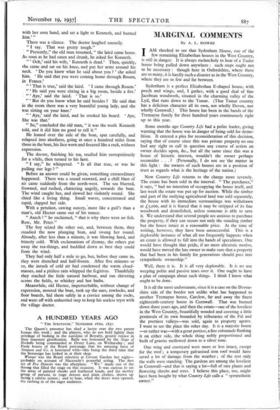MARGINAL COMMENTS
By A. L. ROWSE
IAM shocked to see that Sydenham House, one of the few remaining Elizabethan houses in the West Country, is still in danger. It is always melancholy to hear of a Tudor house being pulled down anywhere : such steps ought not to be necessary : though here in Oxfordshire, where there are so many, it is hardly such a disaster as in the West Country, where they are so few and far between.
Sydenham is a perfect Elizabethan E-shaped house, with porch and wings, and, I gather, with a good deal of fine Jacobean woodwork, situated in the charming valley of the Lyd, that runs down to the Tamar. (That Tamar country has a delicious character all its own, not wholly Devon, nor wholly Cornwall.) This house has been in the hands of the Tremayne family for three hundred years continuously right up to this year.
Some months ago Country Life had a polite leader, giving warning that the house was in danger of being sold for demo- lition. It entered a plea for reconsideration of this decision, saying that of course since this was private property no one had any right to call in question any course of action an owner decides upon, &c., but all the same since this was a house of historic interest, wouldn't the owner perhaps reconsider . . . ? (Personally, I do not see the matter in this light : the owners of such houses are in a position of trust as regards what is the heritage of the nation.) Now Country Life returns to the charge more severely. The estate has been sold in the interval. " The purchaser," it says, " had no intention of occupying the house itself, and last week the estate was put up for auction. While the timber and part of the outlying agricultural land was sold separately, the house with its immediate surroundings was withdrawn at L5,000, and it is feared that it may be stripped of its fine woodwork and demolished, unless someone is able to save it. We understand that several people are anxious to purchase the property, if they can secure not only the standing timber but the house intact at a reasonable price. At the time of writing, however, they have been unsuccessful. This is a deplorable instance of what all too frequently happens when an estate is allowed to fall into the hands of speculators. One would have thought that pride, if no more altruistic motive, would have moved the late owner to make sure that a property that had been in his family for generations should pass into sympathetic ownership."
Well, there it is. It is all very deplorable. It is no use weeping polite and passive tears over it. One ought to have a plan of campaign about such things. I think I know what ought to be done.
It is all the more unfortunate, since it is a case on the Devon- shire side of the border not unlike what has happened to another Tremayne house, Carclew, far and away the finest eighteenth-century house in Cornwall. That was burned down three years ago, and then the estate—one of the loveliest in the West Country, beautifully wooded and covering a little peninsula of its own bounded by tributaries of the Fal and the prettiest valleys—was sold, again to property agents. I went to see the place the other day. It is a majestic house —or rather was—with a great portico, a fine colonnade flanking it on either side, the whole thing nobly proportioned and built of granite mellowed down to a silver tone.
One wing and courtyard were more or less intact, except for the roof ; a temporary galvanised iron roof would have saved a lot of damage from the weather ; of the rest only the walls were standing. The gardens are among the loveliest in Cornwall—and that is saying a lot—full of rare plants and flowering shrubs and trees. I believe this place, too, might have been bought by what Country Life calls a " sympathetic owner."
















































































































 Previous page
Previous page